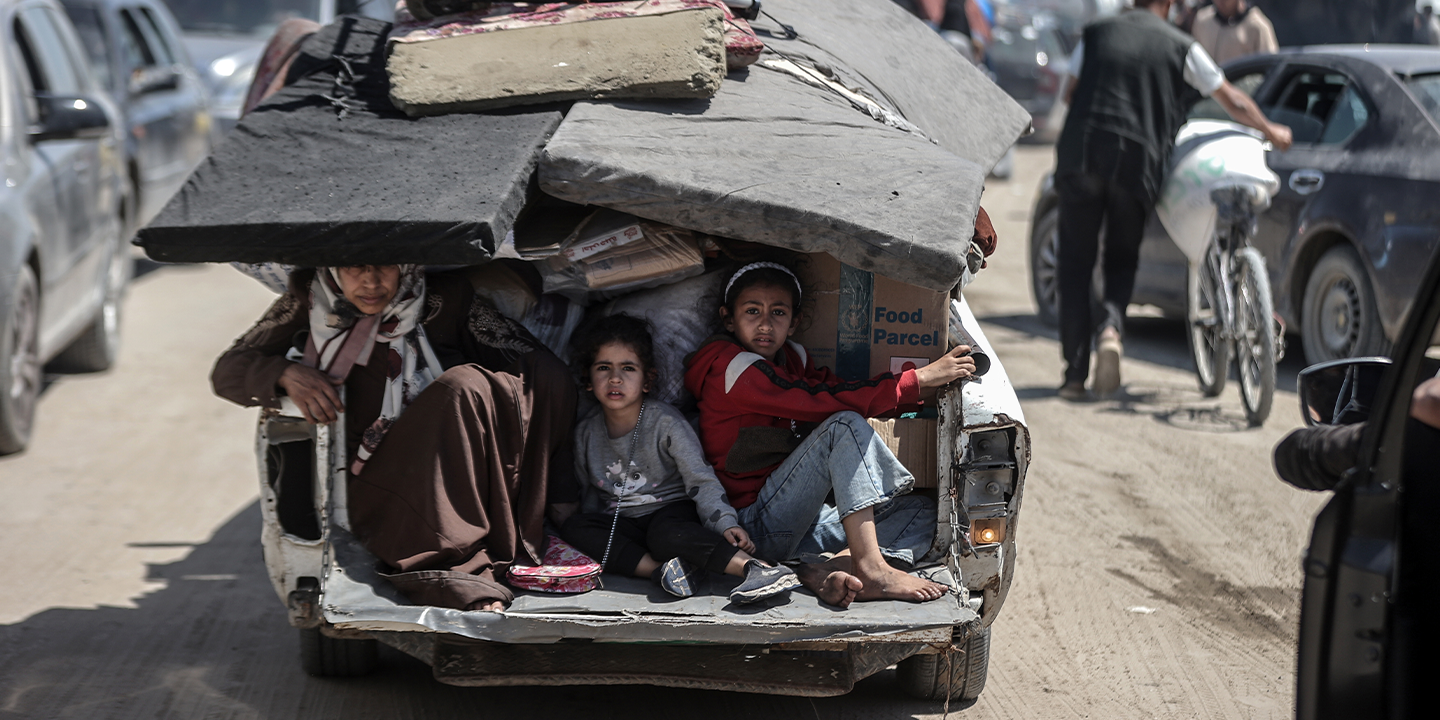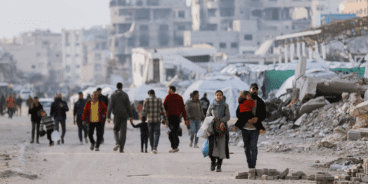

Atrocity Alert No. 395: Israel and the Occupied Palestinian Territory, Myanmar (Burma) and Haiti
Atrocity Alert is a weekly publication by the Global Centre for the Responsibility to Protect highlighting situations where populations are at risk of, or are enduring, mass atrocity crimes.
HUNDREDS OF THOUSANDS DISPLACED AGAIN AS ISRAEL’S ASSAULT ACROSS GAZA CONTINUES
In the past week, approximately 20 percent of Gaza’s population has been displaced yet again. Over 450,000 people have fled from Rafah as Israeli bombardments and ground operations intensify in southern Gaza. According to the UN Relief and Works Agency for Palestine Refugees in the Near East, this includes people with disabilities, older people, injured and chronically ill persons and pregnant women. Concurrently, 100,000 people have been displaced in northern Gaza as Israeli bombardments and ground hostilities escalate around Jabaliya Refugee Camp and Gaza City.
Rafah had previously been designated as a safe zone for civilians following successive “evacuation orders” by Israeli forces. Humanitarian agencies have repeatedly warned that Al Mawasi – where Palestinians sheltering in Rafah were directed to move prior to the latest escalation – is unable to manage an influx of displaced persons and lacks basic services, including food, water, medicine, electricity and sufficient shelter. According to the UN Office for the Coordination of Humanitarian Affairs, those fleeing are setting up tents and makeshift shelters in the rubble of destroyed buildings.
Under international law people must have adequate time to prepare for an evacuation, a safe route to a safe area with access to aid and fundamental guarantees of safety and return. These are absent from Israel’s successive evacuation orders, which may cause the directives to amount to the war crime and crime against humanity of forcible transfer.
Meanwhile, according to the Gaza Government Media Office, a mass grave was found at Al Shifa Hospital in Gaza City, bringing the total number of mass graves discovered near hospitals to seven, with 520 bodies recovered. According to a group of UN Special Procedures, these graves have included women and children, “with many reportedly showing signs of torture and summary executions, and potential instances of people buried alive.” On 10 May the UN Security Council issued a press statement on the situation for the first time since 7 October 2023, underlining the need for accountability and independent investigations.
Savita Pawnday, Executive Director of the Global Centre for the Responsibility to Protect, said, “The scale and intensity of mass atrocity crimes in Gaza continues to surpass our worst nightmares. So-called evacuation orders that forcibly displace suffering people again and again, the closure of crossings that deny aid to families and children facing famine, relentless bombardments and mass graves that reveal evidence of torture, all demonstrate a certain contempt for international law and the protections it extends to vulnerable populations.”
All parties to the conflict must ensure that humanitarian aid crossings are not placed at risk by military operations and that the crossings remain safe and functional for the unimpeded flow of life-saving humanitarian aid into Gaza. Independent and impartial investigators must be allowed access to uncovered mass grave sites. A permanent ceasefire should be reached immediately.
OVER 3 MILLION CIVILIANS DISPLACED AND 5,000 KILLED SINCE MYANMAR’S MILITARY COUP
On 3 May the UN Resident and Humanitarian Coordinator for Myanmar, Marcoluigi Corsi, announced in a statement that more than 3 million civilians have now been displaced in Myanmar (Burma) by conflict. The pre-existing humanitarian crisis in Myanmar has been compounded by the February 2021 military coup and intensifying conflict. Resident Coordinator Corsi said, “Sadly, civilians not involved in the conflict pay the highest price across the country with many seeing no other option but to flee seeking safety. The 3 million displaced people are struggling to survive amid a widespread humanitarian crisis that has left a total of 18.6 million people in need. This is a million more than the previous year.”
The number of internally displaced people increased by 50 percent in the past six months alone due to a marked escalation in the fighting between the military and ethnic resistance organizations (EROs) since the launch of Operation 1027. Fighting has engulfed at least two thirds of the country. EROs have recently made significant territorial gains across the country, posing the most serious setback for the junta since the coup. Facing these challenges, the junta resurrected an abusive military conscription law, prompting many civilians to attempt to flee. Accusations of the forced conscription of over 1,000 Rohingya – a Muslim minority group targeted by the military in a genocide since 2016 – have also surfaced.
Meanwhile, on 10 May the Assistance Association for Political Prisoners (Burma), a human rights group based in Thailand, stated that the death toll since the coup has surpassed 5,000 civilians. Amid the ongoing clashes, civilians continue to be at risk of indiscriminate and targeted aerial attacks and shelling, as well as from unexploded ordinance. On 9 May a junta airstrike on a monastery in the Magway region killed at least 15 people, while 32 others were killed during fighting in the Mandalay region. On 11 May a military raid in the town of Let Htoke Taw, Sagaing region, killed at least 30 people. Targeted attacks on civilians and civilian infrastructure are violations of international law and may amount to war crimes and crimes against humanity.
In response to the deteriorating crisis, last month the UN Security Council held a public meeting on the situation in Myanmar. Meanwhile, the UN Secretary-General announced the long-awaited appointment of his new Special Envoy on Myanmar. While these are welcome actions, far more needs to be done to address the neglected crisis in Myanmar. The international community must work with local humanitarian organizations to deliver aid across ERO-held territory. Additional states must coordinate and impose sanctions on the jet fuel, funds and arms that provide the junta with the means to perpetrate atrocities.
WOMEN AND CHILDREN BEARING THE BRUNT OF ARMED VIOLENCE IN HAITI
Coordinated attacks by gangs continue across Port-au-Prince, Haiti, threatening populations with barrages of gunfire and deepening the already dire humanitarian crisis. On 10 May armed men raided the coastal community of Gressier, injuring people, burning cars and several homes and forcing at least 4,400 people to flee for safety. The raid came nearly a week after a string of attacks on neighborhoods in central Port-au-Prince, which displaced more than 5,100 people and was one of the biggest attacks to take place since the Transitional Presidential Council was sworn into office on 25 April. One survivor of these attacks recounted, “The gangs started burning everything in sight.”
The ongoing crisis has had a devastating impact on women and children. On 8 May Save the Children warned that record high hunger levels in Haiti are forcing children to join gangs, with some children killing, kidnapping and looting for food. Food shortages – due in part to the escalating violence since 29 February and gangs controlling key transport routes and ports – have resulted in one in two children facing acute food insecurity. Approximately 30 to 50 percent of the gangs in Haiti have children within their ranks, with the majority forcibly recruited while others joined voluntarily as a survival tactic.
Meanwhile, on 6 May a group of UN Special Procedures sounded the alarm that widespread violations of women and girls’ rights continue with impunity. According to a joint report by the Haitian government and UN humanitarian partners released this month, the number of gender-based violence survivors was five times higher in March than in January and February combined. Approximately three quarters of the cases concern sexual violence. Women and girls fleeing fighting have been at particularly heightened risk, with 78 percent of survivors being internally displaced people.
The UN Special Procedures stressed that gangs are continuing to use sexual violence against women and girls as a primary tactic to instill fear, extort money, gain control of power and punish communities. The UN Security Council-mandated Panel of Experts also recently observed that the use of sexual and gender-based violence is pervasive among gangs in Haiti and not the result of an isolated incident.
Christine Caldera, Haiti expert at the Global Centre for the Responsibility to Protect, said, “Women and girls are disproportionately bearing the brunt of the crisis gripping Haiti, enduring relentless suffering and trauma. There is an urgent need for sustainable measures that protect the rights of women and girls, while accountability is paramount for prevention and non-recurrence.” As the political transition process advances, the societal, economic and political inclusion of women and girls must be bolstered. Sufficient resources are urgently needed to allow for the immediate and safe delivery of life-saving aid, and humanitarian spaces and critical infrastructure must be protected.
Related Content


Atrocity Alert No. 433: Israel and the Occupied Palestinian Territory, Myanmar (Burma) and Mali
